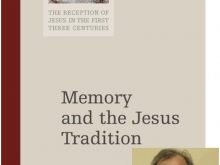A Midrashic Hypothesis for the Gospels
Continuing my reading of part 2 of Nanine Charbonnel’s Jésus-Christ, Sublime Figure de Papier . . . . . . . o . . . At the heart of Nanine Charbonnel’s thesis lies the question of how much we read in the gospels was written in a figurative sense and how much literal. Arthur Schopenhauer … Continue reading “A Midrashic Hypothesis for the Gospels”
